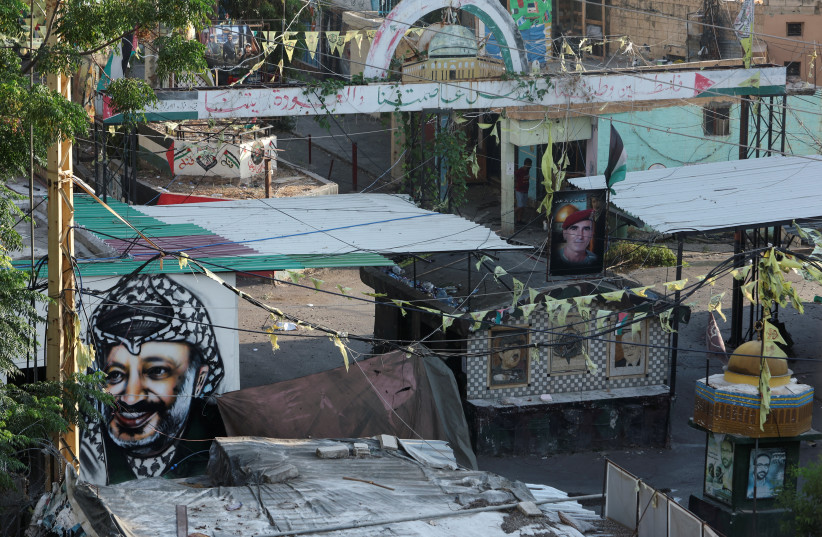Five Lebanese soldiers were injured, including one in critical condition, after shells fired during clashes between Fatah and Islamic militants in the Ain al-Hilweh refugee camp in southern Lebanon hit military positions on Sunday, according to Lebanese reports.
The clashes broke out on Thursday night, with RPG and machine gun fire displacing hundreds. A number of civilians in nearby towns have been injured by stray bullets as well. At least six people have been killed and dozens injured amid the violence.
The Lebanese Army warned after the soldiers were injured that the army would take "appropriate measures" in response to such incidents.
According to the Lebanese LBCI television network, an audio recording was circulated on social media attributed to Haitham al-Shaabi, an official from the "Muslim Youth" group, on Thursday in which he said the group was launching a battle to "purge the Ain al-Hilweh camp of apostates." Fatah and the Muslim Youth have repeatedly fought for control of the camp.

Amid the fighting on Sunday, a shell fell on the home of Hamas official Khaled Zuaiter in the camp, according to the Lebanese Elnashra news agency. Rockets and bullets have fallen in areas outside of the camp amid the clashes as well.
Despite intensive efforts by Palestinian and Lebanese officials to implement a ceasefire, all such efforts had seemingly failed as of Sunday afternoon. A source in the Joint Palestinian Action Committee told L'Orient Le Jour that efforts to reach a ceasefire had ended in the meantime due to the lack of success.
Later in the afternoon, the Muslim Youth group declared a unilateral ceasefire, calling on all parties to stop the fighting. Around the time of the announcement, the intensity of the clashes reportedly decreased. Fatah leaders reportedly circulated a statement that they would continue fighting until they defeated the Islamist groups and clashes reportedly renewed shortly afterward.
Lebanese MP links clashes to Iran-backed axis
MP Ashraf Rifi demanded that the security of the Palestinian refugee camps in Lebanon be placed under the control of the Lebanese government. Rifi additionally accused the axis of Iran-backed militant groups of playing a "dangerous role" in the tensions in the camp and being linked to the killing of a Fatah official in July, stating "this is the Arab-Persian conflict, even if it is camouflaged."
Rifi claimed that the Iran-backed axis was attempting to spark a conflict like the 2007 Lebanon conflict between Lebanese security forces and the Fatah al-Islam Islamist militant group in the Nahr el Bared refugee camp. Additional clashes took place in Ain al-Hilweh and near Beirut in the 2007 conflict.
Additionally on Sunday, Elias Al-Bisari, Lebanon's director general of public security, called on the Palestinian factions to come to an emergency meeting on Monday at the headquarters of the General Directorate of Lebanon's General Security to discuss the situation in Ain al-Hilweh.
On Saturday, the Red Cross began setting up tents to host Palestinians fleeing the violence, but Lebanese authorities later forced them to take them down after complaints by local residents, according to Lebanon's National News Agency. An UN Relief and Works Agency for Palestine Refugees (UNRWA) school in Sidon was opened to host those displaced by the fighting instead.
Caretaker prime minister Najib Mikati contacted Palestinian Authority President Mahmoud Abbas on Saturday and called for an urgent ceasefire in the camp
"What is happening does not serve the Palestinian cause and constitutes grave harm to the Lebanese state in general, especially to the city of Sidon, which hosts our Palestinian brothers," said Mikati. "What is required, in return, is for them to deal with the Lebanese state in accordance with its laws and regulations and to preserve the safety of its citizens."
On Friday, United Nations Resident Coordinator and Humanitarian Coordinator for Lebanon Imran Riza called on the militants to leave the eight UNRWA schools they are holding and to reach a ceasefire.
"Education institutions must be safe and neutral spaces, critical for children's learning, well-being, and growth. The use of armed groups of schools amounts to gross violations of both International Human Rights Law and International Humanitarian Law endangering children's rights to a safe learning environment, and jeopardizing their future and the future of their community," said Riza.
"I urge armed groups to stop the fighting in the camp and vacate these schools immediately. I also call for the facilitation of the work of UNRWA and other humanitarian organizations to provide much-needed protection and assistance to families in need in the camp."
13 killed in clashes in refugee camp earlier this year
In late July and early August, 13 people were killed amid clashes between Fatah and Islamist groups in the refugee camp. Thousands of people were displaced due to the clashes.
The clashes in late July were sparked after the killing of an Islamic militant by Fatah militants, followed by the killing of Fatah official Abu Ashraf al-Armoushi and four other Fatah members in the camp. Fatah has repeatedly demanded that the militants who killed Armoushi be given up.
On August 3, a ceasefire was reached, with the violence ending shortly afterward. Tensions remained high in the camp, however, with humanitarian access inhibited in certain parts of the camp, according to the UNRWA.
